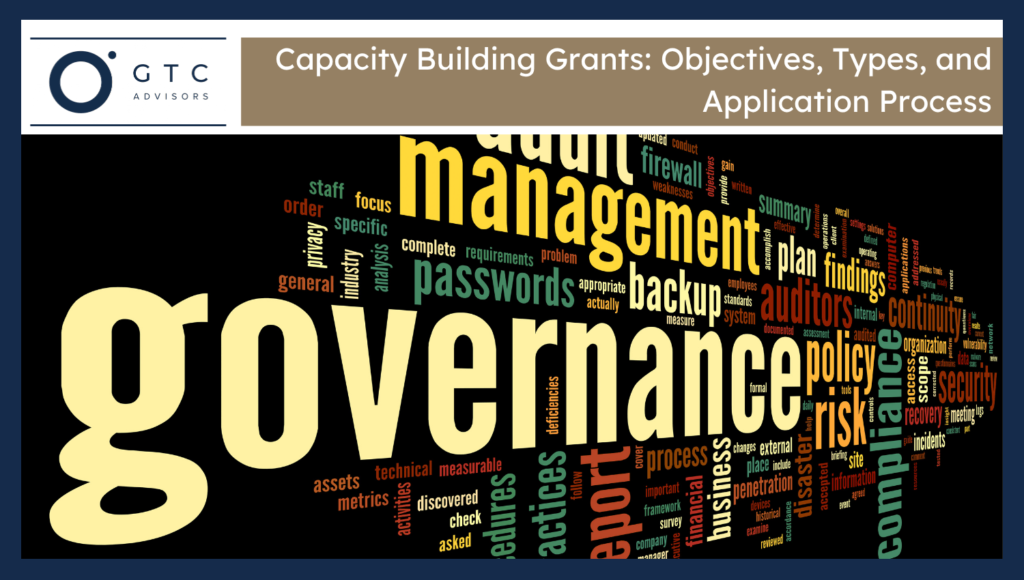Capability building grants are awards used to enhance the internal capability of nonprofit, educational or governmental institutions. Such grants are based on long-term sustainability rather than direct delivery of services. They assist organisations in enhancing planning, leadership and operations. The support can involve strategic planning, training of staff, leadership development, or updating technology. They help in creating effective evaluation and reporting systems as well. These grants can help organisations to develop and grow, change and manage their resources to enhance their service outcomes and long-term mission achievement.
What Are the Key Objectives of Capacity Building Grants?
Below are the five main objectives of capacity building grants:
- Organisational Effectiveness: The purpose of these grants is to enhance systems, workflow and internal processes. They provide organisations with smoother delivery of services and improved results.
- Leadership & Governance: Leadership training and board development are supported. This creates stable decision-making and consequences.
- Strategic Planning & Innovation: Grants are used to finance long-term planning and create innovativeness. They promote organisations to change and develop sustainability.
- Community Engagement: The money is utilised in forming better relationships with communities. This gives a boost to trust, feedback and participation.
- Financial Sustainability: Grants are used to enhance fundraising, budgeting and financial management practices. The result is stability in the long term.
What Are the Types of Capacity Building Grants?
Here are the seven main types of capacity building grants:
- General Operating Support: These grants are unrestricted and are used in day-to-day activities. They assist in funding salaries, rents, utilities and fundamental operations. This provides organisations with the flexibility to build on their infrastructure and act on new demands.
- Project-Specific Capacity Grants: The funding is assigned to certain capacity-building projects. That includes things like buying new IT, improving data management, or doing more outreach-related things. It is impossible to spend money on unrelated costs.
- Technical Assistance Support: These grants cover professional advice and consulting. They are used to enhance organisational systems, design policies or train personnel in specialised departments.
- Leadership & Talent Development: Grants are about developing leadership and teamwork skills. They include coaching, professional development, succession planning, and hiring of talented employees.
- Governance Improvement Grants: Funding can be used to support board structures and practices. It assists in the training of the board, review of policies and development of more transparent accountability structures.
- Partnership & Collaboration Grants: These grants are used to promote collaboration with organisations. They finance collaborative planning, shared services or joint program design.
- Evaluation & Impact Grants: Finances are used to develop evaluation models and assess outcomes. They assist organisations to monitor progress, measure results and report on the outcomes.
What is the Application Process for Capacity Building Grants?
These are the eight steps of applying for a capacity building grant:
1. Grant Announcement
The funding agency announces the process publicly. It contains the purpose of the grant, eligibility, deadlines, and submission information. Before beginning, applicants are advised to read all the instructions.
2. Needs Assessment
Organisations evaluate their existing capabilities to determine gaps. This involves examining the skills, the infrastructure, governance and systems of the staff. The objective is to identify what needs to be improved through the grant.
3. Proposal Development
A detailed proposal is produced according to the assessment. It identifies objectives, action steps, the schedule, resources, and results. The proposal needs to show the effect of the grant on enhancing the organisational capacity.
4. Technical Assistance
Most funders provide assistance at the application stage. This can include webinars, templates, guides or one-to-one help. It assists candidates in enhancing proposal quality and delivering as per the expectations of the funders.
5. Submission and Review
The filled application is sent via the mentioned platform or through email. All the applications are reviewed by the funder with set criteria. These can be project relevance, viability, and impact potential.
6. Award Notification
The successful candidates are then notified or awarded a formal notification letter. It contains the grant amount, terms and any further action. Applicants who are unsuccessful can be given a feedback or advised to apply again in the future.
7. Implementation & Monitoring
The approved activities are implemented by the organisation. Funders can demand updated reports or progress reports. Monitoring is used to check whether the project is progressing well and achieving the objectives.
8. Final Evaluation & Reporting
A final report is necessary at completion. It provides a summary of the results, achievements and difficulties encountered. This assists the funder in determining the overall effectiveness of the grant.
Who Can Apply for Capacity Building Grants?
Here are five groups that can get capacity building grants:
- Any nonprofit organisation operational in the field of education, health or social services is free to apply.
- The educational institutions that can be supported in terms of development and training are schools, colleges, and universities.
- Agencies of healthcare and human services, such as hospitals and clinics, can apply to enhance service capacity.
- Faith-based organisations offering community support or outreach services are eligible too.
- Governmental or quasi-governmental bodies such as local authorities or tribal agencies are eligible to apply for system improvement grants.

George C. Tagg, Jr.
George serves as a trusted counsel to business leaders, non-profit executives, and management teams. George is a licensed attorney with a master’s in international affairs and over 20 years’ experience in the U.S. Congress, Department of State, Department of Defense, global public policy, and political campaigns.


